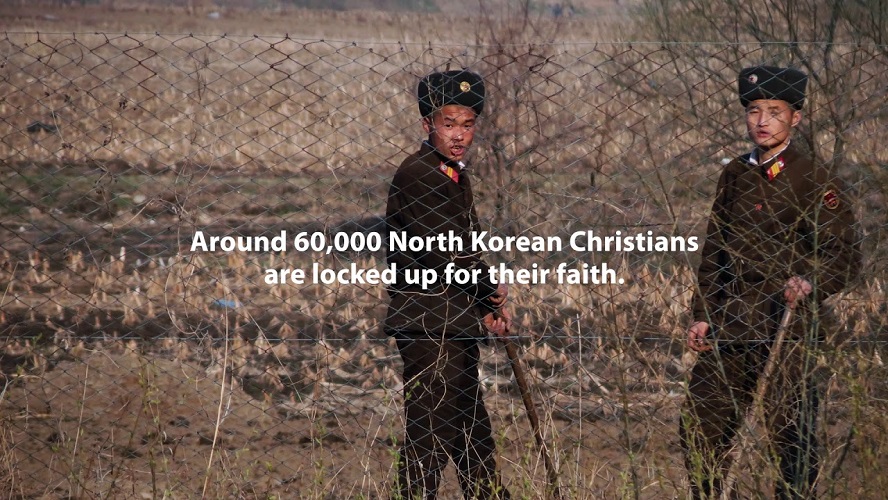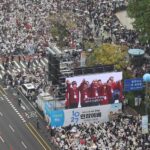Blog Post
Atheism in America, persecution in North Korea (and other stories)
A roundup of important news from around the interwebs.
***
The trends we have been examining on this blog for several years have been confirmed by more data, as per The Christian Post:
The most common religious identity among young adults in the U.S. is “none,” and the majority of Americans don’t believe it’s necessary for a person to believe in God to be moral and have good values, a new survey has found. Released Tuesday, AEI’s Survey Center on American Life investigating contemporary religion in the U.S. found that among young adults (age 18 to 29), the most common religious identity today is none. More than one in three (34%) young adults are religiously unaffiliated.
Nearly nine in 10 (87%) Americans report they believe in God, but just over half (53%) report they believe in God without any doubts at all. Of these, more than eight in 10 white evangelical Protestants (87%) and black Protestants (83%) say they are absolutely certain God exists. Overall, 42% of Americans have a close social connection with someone who is religiously unaffiliated — up from 18% in 2004…
The study also found that Americans are almost equally divided over whether it is better to discuss religious beliefs and ideas with those who do not share the same perspective, and most Americans have never been invited to church. A majority (54%) of Americans say they have not been asked to participate in a religious service in the past 12 months or have never been asked.
As a number of religious scholars have already noted—and as I wrote in my recent column for Convivium Magazine, “When Believers Become Invisible”—it is up to the religious to undertake the process of evangelization (or re-evangelization.)
***
More good news from Ohio:
A ban on the use of telemedicine in medication abortions passed through an Ohio House committee on Tuesday. There was no discussion of Senate Bill 260 before the vote, with many who would have testified in person avoiding the Statehouse due to recent COVID-19 diagnoses among legislators. This was also the case when the House passed a bill requiring abortion providers to pay for burial or cremation of fetal remains after surgical abortions.
This is yet another reminder that much of the essential work the pro-life does is on the state level, rather than at the federal level.
***
Joseph Shapiro of NPR has just released an essential and heartbreaking investigative report titled “As Hospitals Fear Being Overwhelmed By COVID-19, Do The Disabled Get The Same Access?” The short answer is no:
An NPR investigation looked into McSweeney’s death and about a dozen reports of discrimination in Oregon: Of doctors and hospitals denying equipment like ventilators; insisting that an elderly or disabled person sign a DNR — maybe when they couldn’t understand it and in the middle of a crisis — or even denying a COVID-19 test.
These decisions are made behind closed doors, NPR found, and as a result are little known and little understood. McSweeney’s case offers a rare look at how those decisions are made.
When people met Sarah McSweeney they saw different things.
Most saw what she couldn’t do. McSweeney had quadriplegia, cerebral palsy and other disabilities.
Because she couldn’t walk, or even use her hands, someone had to push her in her wheelchair.
Because she couldn’t speak words, she communicated by making sounds and gestures.
Because she couldn’t eat solid foods, someone fed her a supplement of nutrients through a tube to her stomach.
A smaller number of people, but the ones who knew her best, saw something different. They saw what was possible for McSweeney. They saw the choices she made and the things she did.
“She absolutely adored going into malls and getting her makeup done. And getting her hair done and doing typically girly stuff that girls like to do — get pedicures and manicures,” says Kimberly Conger, the nurse manager for Community Access Services, or CAS, the nonprofit agency that provided services and ran the group home where McSweeney lived.
Kimberly Conger, the nurse manager for McSweeney’s group home, objected when a doctor said the disabled woman needed to be on a ventilator but then questioned her quality of life: “I feel like they didn’t feel like she was worth that.”
The people who worked with her enjoyed her vivacious personality. She smiled and laughed and loved to make others smile and laugh. There’s a picture of McSweeney sticking out her tongue and laughing at the camera. Her dark hair is dyed a bright red, a color that clashed with her neon-pink wheelchair.
“Her smile would bring a smile to everyone in the room,” says Anna Keenan-Mudrick, who runs CAS.
The two views of Sarah McSweeney would collide once she went to the hospital — and during the nearly three weeks she was there.
Read the whole thing. The pandemic has highlighted, once again, the growing eugenic mindset in our culture—and has given us the opportunity to confront it head on. Good on NPR for publishing this essay—this is what journalism should be.
***
Finally, a new report covered by The Christian Post reminds us of the horrors endured daily by Christians in North Korea:
A new report has exposed the atrocities done to North Korean Christians arrested for their faith, including forced abortions, the murder of newborn babies, and death by execution for possessing a Bible. The London-based Korea Future Initiative published its latest report, “Persecuting Faith: Documenting religious freedom violations in North Korea,” which includes information from 117 interviews with those exiled from the isolated country.
The investigation documents 273 victims of religious freedom violations, ranging in age from just 3 years old to over 80 years old. Though adherents of various religions are held in North Korea’s “reeducation” camps, the harshest punishments are reserved for Christians, the report found.
More than 200 Christians were identified as victims punished for crimes, including religious practice, religious activities in China, possessing religious items, contact with religious persons, attending a place of worship, and sharing religious beliefs.Bottom of Form The report documented the various methods of torture victims endured in North Korea’s prison camps, including strangulation, starvation, being forced to ingest polluted food, sleep deprivation, and excessive beating.
One former female prisoner recalled, “Men were beaten like dogs. Even in the cell. They screamed like crazy because they hurt so much.
“Even though women were beaten less, I was hit in the face and my skin ruptured and I bled a lot. [Officers] told me to wipe the blood, so I cleaned it. I wept a lot when they hit me again. Blood and discharge ruptured during my next pre-trial examination. They hit me again because I wept.”
In several cases, prisoners found with a Bible or religious pamphlets were executed by a firing squad, while others were locked in electrified cages and fed watery soup. Others were executed for smuggling Bible pages into the country from China for North Koreans to make prayer books.
In one instance, a victim found in possession of a Bible was publicly executed in front of over 1,000 people. The victim was tied to a wooden stake and executed by an MPS firing squad.
One witness told KFI, “I saw the flesh fall off. That is how close I was.”
Another man, who had converted to Christianity, was allegedly forced into a metal cage that was just 3 feet high and 4 feet wide.
“There were steel bars on all four-sides that were heated with electricity,” he told KFI. “Usually prisoners lasted only three or four hours in the cage, but I sat there for 12 hours and prayed. I kept praying to God to save me.”
The man eventually soiled himself and passed out before being beaten by guards, leaving him with severe injuries.
Investigators documented 32 incidents of sexual violence against women — who made up 60% of victims identified in the report — and forced abortions.
At North Hamgyong Provincial MSS pre-trial detention center, for example, pregnant women were forced to get an injection to trigger labor. After giving birth to live babies, the newborns would be taken from them, smothered by guards using plastic sheets or cloth sacks, and then discarded in a cleaning cupboard.
“Mothers of the aborted infants were forced to resume manual labor the day after the abortion and without medicine or rest,” the report noted.
Girls as young as 3 were forced to undergo “degrading internal and invasive nude” body cavity searches, according to the report.
In some cases, entire families were arrested and sentenced to separate political prison camps for adhering to Christianity.
One individual interviewed shared how 10 attendees of Bible study groups were arrested and sentenced to political prison camps. Later, the parent of one of the victims was informed that their child had died at a political prison camp.
Il-lyong Ju, an exiled human rights advocate who helped author the report, said North Koreans are “indoctrinated to despise religion from an early age” and to “deify the supreme leader.”
“The cruel actions of the privileged few in North Korea who take our lives and control our thoughts must be prevented,” he said.
“North Korean officials, whose crimes evoke thoughts of Auschwitz, must be identified and held accountable. And we must not forget the testimonies of the survivors in this report who have overpowered death in North Korea. This is the least that we, the free North Koreans, and you, the reader who has been granted freedom at birth, can do as our collective act of humanity. We have freedom. The North Korean people do not.”
Through the report, conducted over a period of seven months in 2019-2020, KFI said it hopes to “provide an accurate accounting of patterns of documented religious freedom violations perpetrated against North Korean citizens and to inform decision-making in the international community.”
Led by Kim Jong Un, North Korea has, for the last 18 years, ranked as the worst persecutor of Christians in the world on Open Doors USA’s World Watch List.
Kenneth Bae, a Korean-American pastor who was held hostage in North Korea from 2012 to 2014, shared how the North Korean government is more afraid of Christians than nuclear weapons. According to Bae, most North Koreans have never heard the name of Jesus.
“They said, ‘we are not afraid of nuclear weapons … we are afraid of someone like you bringing religion into our country and use it against us and then everybody will turn to God and this will become God’s country and we will fall,” Bae said.
This, ladies and gentlemen, is what real persecution looks like. We should not forget it.








